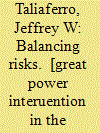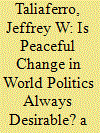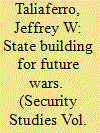| Srl | Item |
| 1 |
ID:
084312


|
|
|
|
|
| Publication |
New York, Cornell University Press, 2004.
|
| Description |
XVii, 305p.
|
| Standard Number |
0801442214
|
|
|
|
|
|
|
|
|
|
|
|
Copies: C:1/I:0,R:0,Q:0
Circulation
| Accession# | Call# | Current Location | Status | Policy | Location |
| 051189 | 327.10904/TAL 051189 | Main | On Shelf | General | |
|
|
|
|
| 2 |
ID:
160060


|
|
|
|
|
| Summary/Abstract |
An assumption runs through this symposium that peaceful change is desirable and ought to be encouraged. We do not believe it is that simple. The term “peaceful change” itself is not well defined. The article, therefore, narrowly defines peaceful change as a process whereby a hegemon voluntarily cedes its dominant geopolitical role to a challenger in one or more regions. Drawing on neoclassical realism, we hypothesize that a declining hegemon will only accept peaceful change if: (1) it has high confidence change is inevitable because it lacks the military, economic, or political means to resist it; or (2) when domestic political or economic costs of resistance of prohibitively high; or (3) when the leadership of the hegemonic state faces domestic constraints in its ability to enact policies to resist the challenger.
|
|
|
|
|
|
|
|
|
|
|
|
|
|
|
|
| 3 |
ID:
076996


|
|
|
|
|
| Publication |
2006.
|
| Summary/Abstract |
Neorealist theory holds that the international system compels states to adopt similar adaptive strategies - namely, balancing and emulation - or risk elimination as independent entities. Yet states do not always emulate the successful practices of the system's leading states in a timely and uniform fashion. Explaining this requires a theory that integrates systemic-level and unit-level variables: a "resource-extraction" model of the state in neoclassical realism. External vulnerability provides incentives for states to emulate the practices of the system's leading states or to counter such practices through innovation. Neoclassical realism, however, suggests that state power - the relative ability of the state to extract and mobilize resources from domestic society - shapes the types of internal balancing strategies that countries are likely to pursue. State power, in turn, is a function of the institutions of the state, as well as of nationalism and ideology. The experiences of six rising or declining great powers over the past three hundred years - China, France, Great Britain, Japan, Prussia (later Germany), and the United States - illustrate the plausibility of these hypotheses
|
|
|
|
|
|
|
|
|
|
|
|
|
|
|
|